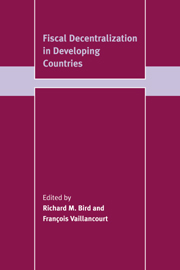Book contents
- Frontmatter
- Contents
- List of tables
- List of contributors
- Preface
- 1 Fiscal decentralization in developing countries: an overview
- 2 China: evaluating the impact of intergovernmental fiscal reform
- 3 India: intergovernmental fiscal relations in a planned economy
- 4 Indonesia and Pakistan: fiscal decentralization – an elusive goal?
- 5 Morocco and Tunisia: financing local governments – the impact on infrastructure finance
- 6 Colombia: the central role of the central government in fiscal decentralization
- 7 Argentina: fiscal federalism and decentralization
- 8 South Africa: an intergovernmental fiscal system in transition
- 9 Bosnia-Herzegovina: fiscal federalism – the Dayton challenge
- Index
Preface
Published online by Cambridge University Press: 09 October 2009
- Frontmatter
- Contents
- List of tables
- List of contributors
- Preface
- 1 Fiscal decentralization in developing countries: an overview
- 2 China: evaluating the impact of intergovernmental fiscal reform
- 3 India: intergovernmental fiscal relations in a planned economy
- 4 Indonesia and Pakistan: fiscal decentralization – an elusive goal?
- 5 Morocco and Tunisia: financing local governments – the impact on infrastructure finance
- 6 Colombia: the central role of the central government in fiscal decentralization
- 7 Argentina: fiscal federalism and decentralization
- 8 South Africa: an intergovernmental fiscal system in transition
- 9 Bosnia-Herzegovina: fiscal federalism – the Dayton challenge
- Index
Summary
Interest in fiscal decentralization has grown greatly all over the world in recent years. The public finances of many developed economies have to varying degrees become more decentralized as one way of attempting to accommodate the fiscal realities of the “post-welfare state” era. Throughout eastern and central Europe new systems of local and intergovernmental finance are being established as part of the evolution away from the old central planning system. Finally, an increasing number of developing countries are turning to various forms of fiscal decentralization as one possible way of escaping from the traps of ineffective and inef- ficient governance, macroeconomic instability, and inadequate economic growth in which so many of them have become mired in more recent years. Discussion of various aspects and issues of fiscal decentralization is thus in the air more or less everywhere these days. Economic theorists are theorizing about fiscal decentralization, applied economists are attempting to measure its potential effects in various dimensions, and policy economists are busily flying around the world dispensing advice about it.
In many developing countries, moreover, fiscal decentralization is not only in the air but also, to varying degrees, already on the ground. The studies in this book describe and analyze some of the many varieties of fiscal decentralization found throughout the developing world.
- Type
- Chapter
- Information
- Fiscal Decentralization in Developing Countries , pp. xiii - xivPublisher: Cambridge University PressPrint publication year: 1999

